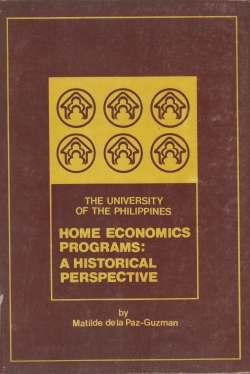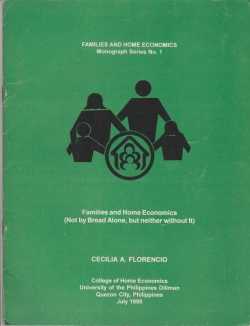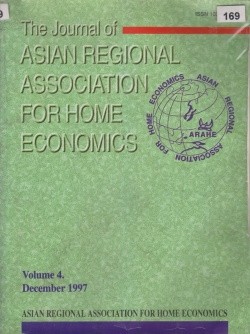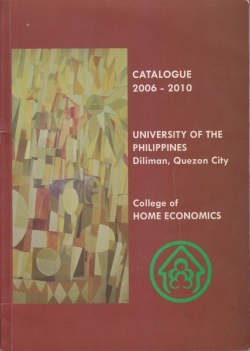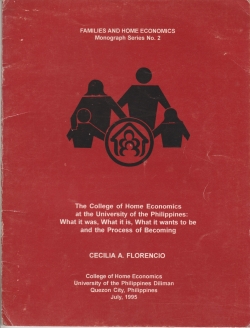U.P. Home Economics Journal
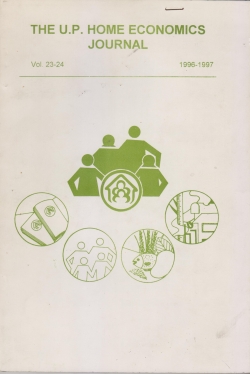
Type
Journal
Authors
ISSN
0115-2750
Category
Journal
[ Browse Items ]
Publication Year
1996
Publisher
Volume
23-24
Issue Type
Annually
Issue Period
1996
Pages
116
Subject
Nutrition
Abstract
The study and practice of home economics have changed very much since the 1920s when it was first introduced in the University of the Philippines. There is little doubt that the discipline will continue to be faced with a need for continuing self-assessment and self-renewal.
A discipline must first know what it is and what it believes in. It must then commit itself without reservation to translating and actuating what it knows and believes in.
In 1990, the faculty of the College of Home Economics collectively defined home economics as the study of families and the management of resources available to them for the satisfaction of their basic needs in changing environments.
The uniqueness of home economics derives from the integration and harmony of the substantive and relational aspects of life. The substantive aspect refers to the commodities: food, clothing and shelter. The relational aspect on the other hand, refers to the relationships within families, among families, and between families and the larger community. The former is necessary to sustain life while the latter gives meaning to life.
Science and arts are the wellspring of home economics. As a discipline, home economics sits astride the physical, biological and social sciences, at the same tome that it draws from the arts. Graduates of the College of Home Economics must remain true to the essential humanism of the discipline while keeping abreast, at the same time, with developments in science and technology. They should be engaged in searching for answers that take into account causal theories and empirical correlations as well as actual context and values.
Home Economics is far beyond teaching how to do things, to examining why things are the way they are, why these need to be transformed, and how the restructuring can be done. The "how to" remains a hallmark of home economics, it is not to be minimized but instead emphasized based on a better understanding of the whys and wherefores and alongside the development of new knowledge and improved skills and technologies. Believing in the richness of Filipino culture, the College will promote a better understanding if this culture through the study and use of indigenous concepts, resources, processes and dissemination strategies.
Strengthening a discipline demands an enduring sense of identity, so it is not pulled in all directions and it does not surrender to short-term interests and immediate gratification. At the same time, it also requires that it be maximally relevant in terms of substance, approach and identification of individuals and groups of people to serve. Higher education goes beyond providing advanced instruction to strengthening character and deepening commitment to develop a just and caring society.
Home economics does not need to belabor its relevance to both day-to-day living and national development. It is in touch with reality and not simply symbolic, and it is engaged in a continuing search for knowledge as a guide to meaningful and productive action. It is regarded in the light of its relation to the general social system and its fundamental concern for the quality of life and families and communities. The Filipino family is recognized as the foundation of the nation and our Constitution provides that the "the State shall strengthen its solidarity and actively promote its total development."
A discipline must first know what it is and what it believes in. It must then commit itself without reservation to translating and actuating what it knows and believes in.
In 1990, the faculty of the College of Home Economics collectively defined home economics as the study of families and the management of resources available to them for the satisfaction of their basic needs in changing environments.
The uniqueness of home economics derives from the integration and harmony of the substantive and relational aspects of life. The substantive aspect refers to the commodities: food, clothing and shelter. The relational aspect on the other hand, refers to the relationships within families, among families, and between families and the larger community. The former is necessary to sustain life while the latter gives meaning to life.
Science and arts are the wellspring of home economics. As a discipline, home economics sits astride the physical, biological and social sciences, at the same tome that it draws from the arts. Graduates of the College of Home Economics must remain true to the essential humanism of the discipline while keeping abreast, at the same time, with developments in science and technology. They should be engaged in searching for answers that take into account causal theories and empirical correlations as well as actual context and values.
Home Economics is far beyond teaching how to do things, to examining why things are the way they are, why these need to be transformed, and how the restructuring can be done. The "how to" remains a hallmark of home economics, it is not to be minimized but instead emphasized based on a better understanding of the whys and wherefores and alongside the development of new knowledge and improved skills and technologies. Believing in the richness of Filipino culture, the College will promote a better understanding if this culture through the study and use of indigenous concepts, resources, processes and dissemination strategies.
Strengthening a discipline demands an enduring sense of identity, so it is not pulled in all directions and it does not surrender to short-term interests and immediate gratification. At the same time, it also requires that it be maximally relevant in terms of substance, approach and identification of individuals and groups of people to serve. Higher education goes beyond providing advanced instruction to strengthening character and deepening commitment to develop a just and caring society.
Home economics does not need to belabor its relevance to both day-to-day living and national development. It is in touch with reality and not simply symbolic, and it is engaged in a continuing search for knowledge as a guide to meaningful and productive action. It is regarded in the light of its relation to the general social system and its fundamental concern for the quality of life and families and communities. The Filipino family is recognized as the foundation of the nation and our Constitution provides that the "the State shall strengthen its solidarity and actively promote its total development."
Description
CONTENTS:
Intrafamily Food Distribution: Issues on concepts and methodology, by Margarita M. dela Paz. -- Physico-Chemical and Functional Properties of Carboxymethycellulose Prepared from Nata de Coco, by L.S. Manguiat and V.C. Sabularse. -- Quality of Smoked and Dried Salted Philippines Fish Products Prepared using Iodized salt, by M.P.V. Azanza, C. de Ocampo, F. Galvez, M. Moises & K. Pujanes. -- Evaluation of the Functional Properties of Squash Flour (Cucurbita maxima duchesne), by Vincent A. Vergara and Ma. Leonora DL. Francisco. -- Philippine Furniture styles from the Pre-hispanic time to the twentieth century, by Adelaida V. Mayo. -- The Influence of Teacher, Course, and Student Characteristics on student ratings of teacher performance, by Marilou R. Lim and Anunciacion V. Lara. -- Gender differences in Pre-schoolers Nutritional status data from Metro Manila and Southern Tagalog, by Ma. Sofia V. Amara and Gracia M. Villavieja. -- Human development, gender equality and home economics, by Cecilia A. Florencio. -- Work, child care and women's life satisfaction, by Aurorita T. Roldan.
Intrafamily Food Distribution: Issues on concepts and methodology, by Margarita M. dela Paz. -- Physico-Chemical and Functional Properties of Carboxymethycellulose Prepared from Nata de Coco, by L.S. Manguiat and V.C. Sabularse. -- Quality of Smoked and Dried Salted Philippines Fish Products Prepared using Iodized salt, by M.P.V. Azanza, C. de Ocampo, F. Galvez, M. Moises & K. Pujanes. -- Evaluation of the Functional Properties of Squash Flour (Cucurbita maxima duchesne), by Vincent A. Vergara and Ma. Leonora DL. Francisco. -- Philippine Furniture styles from the Pre-hispanic time to the twentieth century, by Adelaida V. Mayo. -- The Influence of Teacher, Course, and Student Characteristics on student ratings of teacher performance, by Marilou R. Lim and Anunciacion V. Lara. -- Gender differences in Pre-schoolers Nutritional status data from Metro Manila and Southern Tagalog, by Ma. Sofia V. Amara and Gracia M. Villavieja. -- Human development, gender equality and home economics, by Cecilia A. Florencio. -- Work, child care and women's life satisfaction, by Aurorita T. Roldan.
Number of Copies
1
| Library | Accession No | Call No | Copy No | Edition | Location | Availability |
|---|---|---|---|---|---|---|
| Main | 1366 | 1 | Yes |
